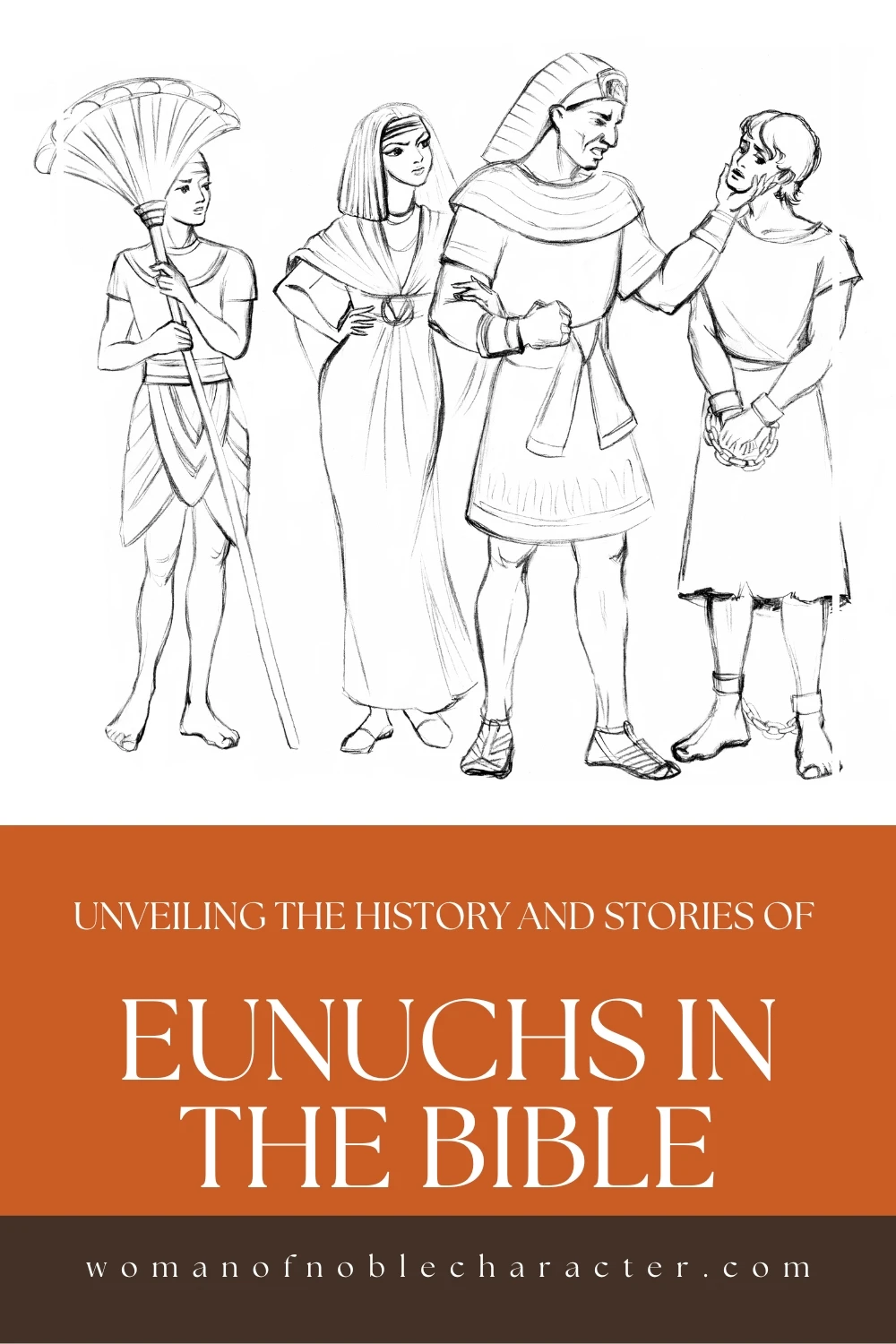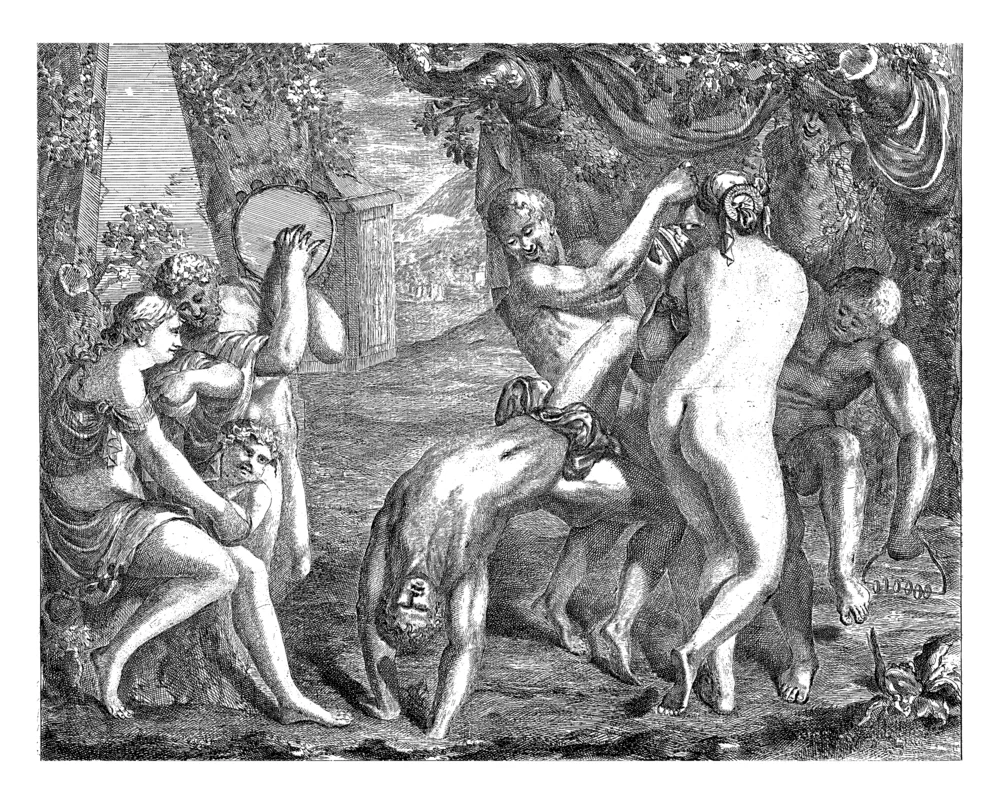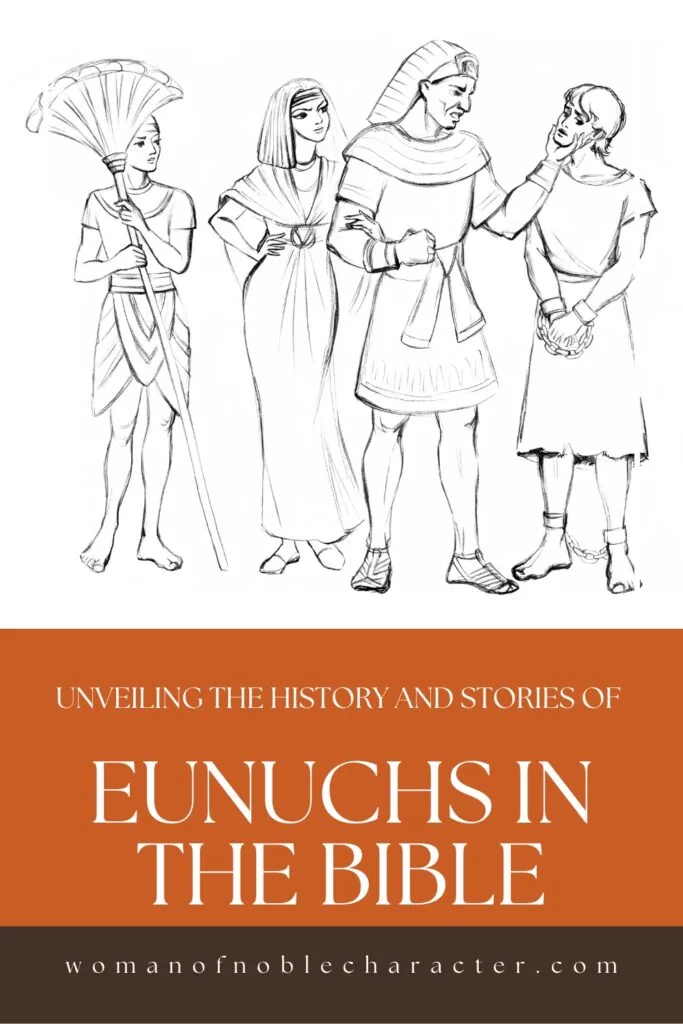This page/post may contain affiliate links. As an Amazon Associate, as well as an affiliate of other programs, this means if you purchase something using these links, I will receive a commission on qualifying purchases at no cost to you! For more detailed information, please visit our Affiliate Disclaimer page
Eunuchs in the Bible
Saris (or cariyc) is the Hebrew word for eunuch pronounced “saw-reece.”, which occurs 45 times in the Old Testament. Of those 45 occurrences, the Greek Septuagint translates it as eunouchos 31 times in the Old Testament. Eunouchos is also used four times in the New Testament.
Rab-saris means “chief eunuch,” specifically to an Assyrian or Babylonian king. This term is used as an official title also in Jeremiah 39:3 and Jeremiah 39:13.
Eunuchs in the Bible are typically defined as a castrated man (with no sex organs) placed in charge over a king’s royal harem of wives and concubines. They were trusted men who were responsible for overseeing the king’s domestic interests, especially in protecting the king’s harems. In the Bible, the Hebrew word saris (eunuch), refers to a man in some sort of service to a ruler, but castration isn’t always a part of the story.
Eunuch is also a title for a royal official, a court officer, or an important official to a ruler who serves in a position of power, trust, or command. For example, Potiphar was an officer (saris) to Pharaoh (Genesis 37:36). But no physical condition of castration or impotence is mentioned, nor is it likely because Potiphar had a wife (Genesis 39).

As United Bible Societies mention, “it is not strange that, by a quite normal process of semantic change, the word evolved to designate a castrated man,” given that “some of these key officials, in certain societies, were castrated because of their occupations” (such as protecting the harem).
The eunuchs in the Bible were normally castrated males or those unable to reproduce due to a birth deficiency. Purposeful castration was intended to cause infertility and eliminate sexual desire. It was a common practice in ancient times for a king or ruler to castrate some of his servants and/or advisers to restrain and subdue them. The loyal attendants or harem guards were sexually impotent and therefore had no interest in marriage but rather an undivided loyalty to the king.
The Greek word for eunuch is eunouchos which means:
1. chamberlain, keeper of the bed-chamber of an eastern ruler.
2. a castrated person.
3. voluntary eunuchs who choose to forego married life.
Eunuchs in the Bible: Old Testament
In the Book of Esther, we see several eunuchs who served in the royal court.
1. In Esther 1:10-12 we see that King Ahasuerus sent his seven eunuchs to fetch Queen Vashti so he can show her off to the people and nobles. These seven eunuchs were Mehuman, Biztha, Harbona, Bigtha, Abagtha, Zethar, and Carkas and they delivered the message back to the King that Queen Vashti refused to come.
2. Hegai is mentioned a couple of times in the book of Esther as “the king’s eunuch, who was in charge of the women” (Esther 2:3, Esther 2:8). Hegai gave Esther good advice in Esther 2:15, and this helped her win the favor, grace, and love of the King and she was made queen. Hegai played a crucial role in the story of Esther.
3. Shaashgaz was another eunuch of King Xerxes who was “in charge of the concubines” (Esther 2:14).
4. In Esther 4:4 we see that Esther had her own eunuchs who came to report to her what was happening with Mordecai.
5. Esther sent Hathach, mentioned in Esther 4:5-9, one of the King’s eunuchs, to find out why Mordecai had put on sackcloth and ashes, and went out into the center of the city and cried out loudly and bitterly.
6. Bigthana and Teresh were two of King Ahasuerus’ eunuchs mentioned in Esther 6:1-2 who had planned to attack the King but Mordecai had reported them.
7. Harbona, who is mentioned in Esther 7:9 told the King how Haman had prepared the gallows to hang Mordecai, whereas Mordecai had saved the King’s life before. The King told Harbona that Haman should be hung on those gallows.
Queen Esther’s eunuchs played a pivotal role in her life and in the affairs of the royal palace too.
Other eunuchs mentioned in the Old Testament
The prophecies in Isaiah 39:7 and 2 Kings 20:18 likely refer to eunuchs who would be castrated and serve in the palace of the King of Babylon. In the Book of Daniel 1, the Israelites went into Babylonian captivity in the third year of the reign of Jehoiakim, King of Judah. Nebuchadnezzar king of Babylon, commanded Ashpenaz, his chief eunuch, to bring from the people of Israel youths without blemish who were to be educated for three years, eat the same food and drink as the King and then stand before the king.
Among the young men the chief eunuch chose were Daniel, Hananiah, Mishael, and Azariah, who got new names from the chief eunuch. It is believed that these four also became eunuchs because of the prophecy given earlier.

The Ethiopian Eunuch in the Bible: New Testament
In the Book of Acts, we read about an unnamed Ethiopian eunuch. According to Acts 8:26-39, he was “an important official in charge of all the treasury” of the Queen of the Ethiopians. The eunuch was traveling back home from worshipping in Jerusalem. He was reading from the book of Isaiah but didn’t understand the messianic prophecy until “an angel of the Lord spake to Phillip,” instructing him to go and join the chariot.
“Then Philip opened his mouth and beginning with this Scripture he told him the good news about Jesus” (vs. 35) and baptized the eunuch in some nearby water. This was such a powerful testimony as he was possibly the first eunuch convert in the early church. The eunuch from Ethiopia who put his confidence in Jesus is a good example of how anyone from any background can enter God’s kingdom.
Types of eunuchs as mentioned by Jesus Christ
In the Gospel of Matthew, we see Jesus Christ speaking to the Pharisees and his disciples about marriage and divorce. When his disciples hear what is considered adultery, they mention that it’s better not to marry, and that’s when Jesus spoke about the kinds of eunuchs in Matthew 19:11-12.
1. Eunuch created by God from their mother’s womb (cryptorchidism)
These males were natural eunuchs born with a birth or physical defect. As the Lord mentioned to Moses in Exodus 4:11-12, he is the one who causes people to become deaf or blind for his purpose and glory. Just like the man who was blind from his mother’s and was later healed by Jesus in John 9:1-3. This miracle was a powerful testimony of God’s power.
2. Eunuchs made by men (through castration or surgery)
Some eunuchs had been castrated against their will and were considered forced eunuchs. A castrated male was not allowed to enter the assembly of God as stated in Deuteronomy 23:1 and not allowed to be a priest as well (Leviticus 21:17-21.)
3. Eunuchs by choice who are devoted to God
Some men chose not to marry and devote their lives to serving God more effectively and living like eunuchs. Apostle Paul was an unmarried man and an example of those who choose not to marry for the sake of the kingdom of heaven, as he expressed in 1 Corinthians 7:7-8. Such men are not physical eunuchs as they willingly don’t marry but rather spiritual eunuchs.
There are also eunuchs in title only. These eunuchs had significant positions of power (including positions close to a ruler, like a king’s house) and remained abstinent and childless because of their jobs. These are the eunuchs we see in the Book of Esther. Many kingdoms also had a chief eunuch.
God’s promise to eunuchs
Let not the foreigner who has joined himself to the Lord say,
Isaiah 56:3-5 (ESV)
“The Lord will surely separate me from his people”;
and let not the eunuch say,
“Behold, I am a dry tree.”
4 For thus says the Lord:
“To the eunuchs who keep my Sabbaths,
who choose the things that please me
and hold fast my covenant,
5 I will give in my house and within my walls
a monument and a name
better than sons and daughters;
I will give them an everlasting name
that shall not be cut off.
There are a few things God promises eunuchs in this passage of scripture. The Holy Bible reframes how God considers a eunuch, not as shameful but rather as accepted.
1. He asks them not to ever call themselves “a dry tree,” which is not fruitful because they were unmarried men who didn’t produce children. They were not useless but rather useful in his kingdom of God.
2. God wanted them to obey the Sabbath and keep his covenants just like any of his children. They were not to look at themselves differently but rather obey God.
3. In the Jewish community, a person’s name is remembered through their sons and daughters, and the eunuchs would not have this. But God promises them something better. They would be given everlasting names and a monument or memorial so they would never be forgotten.
When Jesus Christ came, he made us all children of God. Even outcasts are loved and accepted in the kingdom of heaven. In Biblical times, eunuchs may have been excluded from certain privileges, but in Christ, we are all one.
God loves us all, and if we obey his word and commit ourselves to serve him, we will become the apple of his eyes. He promises to place us in his memory, heart, and eternal kingdom.
There is neither Jew nor Greek; there is neither slave nor free, there is neither male nor female; for you are all one in Christ Jesus.
Galatians 3:28 NKJV
For by one Spirit we were all baptized into one body—whether Jews or Greeks, whether slaves or free—and have all been made to drink into one Spirit.
1 Corinthians 12:13 NKJV
You may enjoy this brief video by David Servant, All About Eunuchs: HeavenWord 7
Or one of these resources:
THE ETHIOPIAN EUNUCH: The complete story of the conversion of the Ethiopian Eunuch and its significance. by Arthur Hagrid Caesar
The Manly Eunuch: Masculinity, Gender Ambiguity, and Christian Ideology in Late Antiquity (The Chicago Series on Sexuality, History, and Society) by Mathew Kuefler
ESV – “Scripture quotations are from The ESV® Bible (The Holy Bible, English Standard Version®), copyright © 2001 by Crossway, a publishing ministry of Good News Publishers. Used by permission. All rights reserved.”
NKJV – Scripture taken from the New King James Version®. Copyright © 1982 by Thomas Nelson. Used by permission. All rights reserved

